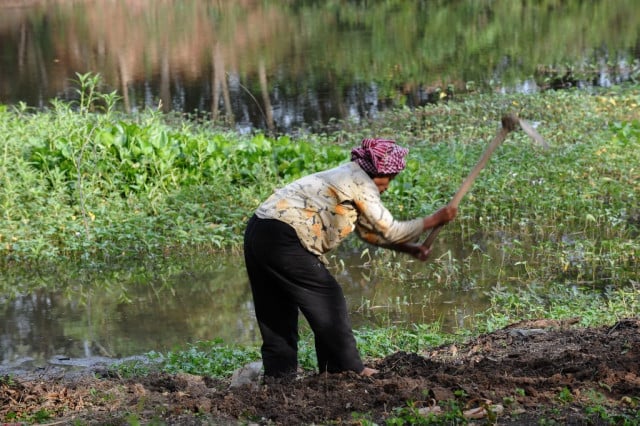Opinion: Farmers At the Mercy of Crop Markets

- By Sreang Chheat
- May 2, 2022 3:53 PM
Here’s what the government can do
Cash crops have been increasing their contribution to Cambodia’s economy and livelihood. In January 2021, figures showed that Cambodia exported 203,485 tonnes of seven major cash crops (milled rice, natural rubber, corn, cashew nuts, peppercorn, fresh bananas, chillies and mangoes) to 28 international markets.
In 2020, Agriculture Minister Veng Sakhon said Cambodia exported 8.55 million tonnes of six major cash crops, worth more than $2.32 billion, through formal and informal channels.
Despite the success, farmers still face market shortages. In the last few years, it has become common for Cambodia’s agricultural products go to waste due to oversupply or lack of markets.
Pumpkins, mangoes, longans and even rice have all suffered drastic price drops at harvest times. Some farmers are better off leaving the products to rot because harvesting would be another financial burden.
In 2016, pumpkins were in high supply and tonnes were dumped or left to rot due low prices, mostly due to limited demand from Thailand.
Other cash crops, including cassava and long melon, also suffered from the lack of market and low prices. The situation reoccurred in 2021 for pumpkin farmers when demand was low from inside the country and from Vietnam.
In the same year, Pailin longan was hit by low prices as Thailand closed off imports. At desperate times like these, farmers call for the government to seek more markets for them. Then, the question to ask is what the government should do to alleviate the situation for the farmers.
For the government, it might be easy to resort to the demand and supply mantra. In a free market, when demand is high and supply is low, the price goes up. Conversely, oversupply results in prices going down.
Cash crops are profitable only when there is demand. Otherwise, farmers might not be able to recoup their investment. This demand is volatile in countries like Cambodia where domestic industry is yet to emerge to the extent that it can absorb all the rising yet insecure production and supply of agricultural products in the country.
This supply and demand theory is what the government has claimed to be responsible for seasonal fluctuation of prices.
In response to the weak market for mangos when seasonal prices are low, the Ministry of Agriculture recommends that farmers should formally register their mangoes so that they become eligible for information on the market and benefits from technical support to increase productivity and quality.
However, this response is not adequate. There is more that the government, in collaboration with the private sector and other stakeholders, can do to alleviate the situation.
The role of the government, therefore, could not be more important. Government leadership in providing market information to match supply and demand is critical. Such information gives farmers flexibility in terms of their decisions to cultivate in anticipation of the market situation by harvest time.
By doing so, the government does a huge favour to farmers to make an educated decision about crops to cultivate. All stakeholders, with the government in a leading role, should consider the three following points to address this demand-supply mismatch:
First and foremost, the government should enhance market information. It is crucial that farmers are informed of market trends with regard to the crops they are cultivating. Especially, market information in countries where the harvests are sold.
It is no secret that the Cambodian government does not necessarily have a strong extension and financial support for the agricultural sector. Compensation for farmers in the event that market is not available for a particular crop is even more remote.
Given these circumstances, strengthening and modernizing the extension service should entail market information shared to the farmers in a more targeted manner.
Second, expanding the domestic market and diversifying the market involves industrialisation in the country. This is the government’s policy intended to develop agroindustry in the country as part of the Industrial Development Policy or IDP.
What this means is that it will create demand for agricultural inputs into the production line to produce semifinished or finished products for customers in and outside Cambodia.
What this means is that the farmers will benefit from this policy, and hence it is imperative that the government ensures that the policy is implemented and achieved according to plan.
The government has claimed that the target of the IDP 2015-2025 has been on track especially in terms of increasing the ratio of the manufacturing to the GDP up to 20%, which has been achieved although the plan to register small and medium enterprises has yet to be achieved.
Ideally, the expanded domestic manufacturing sector provides a more absorbing capacity for the economy of agricultural products.
In Vietnam, the private sector and the government is able to rescue some farmers in time of market failure. In 2020, ABC bakery in Vietnam used dragon fruit unsold due to the Covid 19 in their bread.
The red bread became a symbol of innovation creating instant sensation among the Vietnamese consumers while helping farmers who could not find a market.
Lastly, the government, farmers and development partners should endeavour to establish farmer cooperatives, especially among those who grow crash crops that have a history of oversupply.
Cooperatives are important for the farmer to provide support systems in times of crisis and price negotiation. Cooperatives can help farmers to be more effective in terms of negotiating prices with buyers and getting certification for their crops.
This is because the company which buys the harvest wants to be assured of the estimated amount of harvest, best guaranteed by the cooperative than any individual farmer.
When price is determined by supply and demand, it is not uncommon that the buyers, especially middlemen, can exploit the desperate situation in which the farmer is believed to be in.
Predatory behaviour by middlemen or buyers should be taken into account as well.
Traders are aware of the difficulty farmers face in terms of lack of facilities to store harvest, indebtedness and generally bargaining power. Hence, they tend to devalue the price at the time of harvest.
Given the lack of flexibility the farmer faces in terms of diversity of buyers, the farmer is at the mercy of predatory traders. Cooperatives can provide space for farmers to negotiate with traders on a more equal footing.
Further, the cooperative can take action to handle any surplus left from the market or underselling by turning their harvests into semi- and/or finished products through manufacturing.
In short, while it is recognised that the market determines the price, support infrastructure should be made available for farmers to get the best out of their crisis situation.
Extension service including market information is critical for farmers to make the right decision on crops to grow. Further, diversifying market through enhancing domestic agro-industrial capacity is critical to offset the volatile cross-border trade.
In the meantime, strengthening the solidarity between farmers, especially among those who produce the same cash crop, can provide spiritual, mental and financial support to each other. It can also be true that cooperatives can strengthen their bargaining power and jointly find solution to eventual lack of market or under-pricing.
All these interventions require a strong cooperation among all stakeholders with the government taking the leading role.
Sreang Chheat is a PhD candidate at the School of Political Science and International Studies, University of Queensland, Australia. His research interests include the role of state in development, state reform, social movement, Chinese aid and investment, and democracy.















